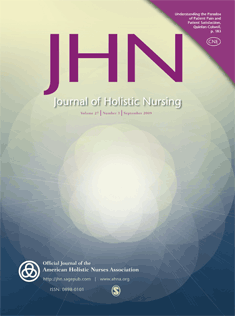Occupational therapists (OTs) are health care professionals specializing in occupational therapy and occupational science. OTs and occupational therapy assistants (OTAs) use scientific bases and a holistic perspective to promote a person's ability to fulfill their daily routines and roles. OTs have immense training in the physical, psychological, and social aspects of human functioning deriving from an education grounded in anatomical and physiological concepts, and psychological perspectives. They enable individuals across the lifespan by optimizing their abilities to perform activities that are meaningful to them ("occupations"). Human occupations include activities of daily living, work/vocation, play, education, leisure, rest and sleep, and social participation.
Dance/movement therapy (DMT) in USA/ Australia or dance movement psychotherapy (DMP) in the UK is the psychotherapeutic use of movement and dance to support intellectual, emotional, and motor functions of the body. As a modality of the creative arts therapies, DMT looks at the correlation between movement and emotion.

Health psychology is the study of psychological and behavioral processes in health, illness, and healthcare. The discipline is concerned with understanding how psychological, behavioral, and cultural factors contribute to physical health and illness. Psychological factors can affect health directly. For example, chronically occurring environmental stressors affecting the hypothalamic–pituitary–adrenal axis, cumulatively, can harm health. Behavioral factors can also affect a person's health. For example, certain behaviors can, over time, harm or enhance health. Health psychologists take a biopsychosocial approach. In other words, health psychologists understand health to be the product not only of biological processes but also of psychological, behavioral, and social processes.

The nursing process is a modified scientific method. Nursing practise was first described as a four-stage nursing process by Ida Jean Orlando in 1958. It should not be confused with nursing theories or health informatics. The diagnosis phase was added later.
Psychiatric nursing or mental health nursing is the appointed position of a nurse that specialises in mental health, and cares for people of all ages experiencing mental illnesses or distress. These include: neurodevelopmental disorders, schizophrenia, schizoaffective disorder, mood disorders, addiction, anxiety disorders, personality disorders, eating disorders, suicidal thoughts, psychosis, paranoia, and self-harm.
Reflective practice is the ability to reflect on one's actions so as to take a critical stance or attitude towards one's own practice and that of one's peers, engaging in a process of continuous adaptation and learning. According to one definition it involves "paying critical attention to the practical values and theories which inform everyday actions, by examining practice reflectively and reflexively. This leads to developmental insight". A key rationale for reflective practice is that experience alone does not necessarily lead to learning; deliberate reflection on experience is essential.

Self-care has been defined as the process of establishing behaviors to ensure holistic well-being of oneself, to promote health, and actively manage illness when it occurs. Individuals engage in some form of self-care daily with food choices, exercise, sleep, reading and dental care. Altogether they follow a fully customised morning routine. Self-care is not only a solo activity as the community—a group that supports the person performing self-care—overall plays a large role in access to, implementation of, and success of self-care activities.

Gerontological nursing is the specialty of nursing pertaining to older adults. Gerontological nurses work in collaboration with older adults, their families, and communities to support healthy aging, maximum functioning, and quality of life. The term gerontological nursing, which replaced the term geriatric nursing in the 1970s, is seen as being more consistent with the specialty's broader focus on health and wellness, in addition to illness.
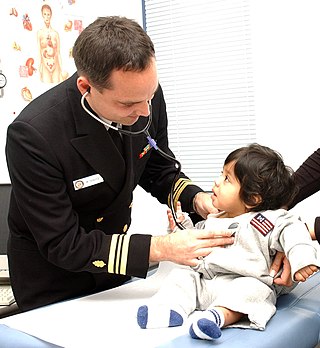
A family nurse practitioner (FNP) provides continuing and comprehensive healthcare for the individual and family across all ages, genders, diseases, and body systems. Primary care emphasizes the holistic nature of health and it is based on knowledge of the patient in the context of the family and the community, emphasizing disease prevention and health promotion.
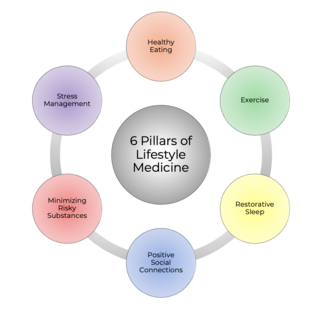
Lifestyle medicine (LM) is a branch of medicine focused on preventive healthcare and self-care dealing with prevention, research, education, and treatment of disorders caused by lifestyle factors and preventable causes of death such as nutrition, physical inactivity, chronic stress, and self-destructive behaviors including the consumption of tobacco products and drug or alcohol abuse. The goal of LM is to improve individuals' health and wellbeing by applying the 6 pillars of lifestyle medicine (nutrition, regular physical activity, restorative sleep, stress management, avoidance of risky substances, and positive social connection) to prevent chronic conditions such as cardiovascular diseases, diabetes, metabolic syndrome and obesity. By focusing on these 6 areas to improve health, LM can prevent 80% of chronic illnesses and non-communicable diseases (NCD).

Nursing is a profession within the healthcare sector focused on the care of individuals, families, and communities so they may attain, maintain, or recover optimal health and quality of life. Nurses may be differentiated from other healthcare providers by their approach to patient care, training, and scope of practice. Nurses practice in many specialties with differing levels of prescription authority. Nurses comprise the largest component of most healthcare environments; but there is evidence of international shortages of qualified nurses. Nurses collaborate with other healthcare providers such as physicians, nurse practitioners, physical therapists, and psychologists. Unlike nurse practitioners, nurses typically cannot prescribe medications in the US. Nurse practitioners are nurses with a graduate degree in advanced practice nursing. They practice independently in a variety of settings in more than half of the United States. Since the postwar period, nurse education has undergone a process of diversification towards advanced and specialized credentials, and many of the traditional regulations and provider roles are changing.

Holistic nursing is a way of treating and taking care the patient as a whole body which involves physical, social environment, psychological, cultural and religious beliefs. There are many theories that support the importance of nurses approaching the patient holistically and how education on this are there to support the goal of holistic nursing. The important skill to be used in holistic nursing would be communicating skills with patients and other practitioners. This emphasizes that patients being treated would be treated not only their body but also mind and spirit.. Holistic nursing is a nursing speciality concerning the integration of one's mind, body, and spirit with his or her environment. This speciality has a theoretical basis in a few grand nursing theories, most notably the science of unitary human beings, as published by Martha E. Rogers in An Introduction to the Theoretical Basis of Nursing, and the mid-range theory Empowered Holistic Nursing Education, as published by Dr. Katie Love. Holistic nursing has gained recognition by the American Nurses Association (ANA) as a nursing specialty with a defined scope of practice and standards. Holistic nursing focuses on the mind, body, and spirit working together as a whole and how spiritual awareness in nursing can help heal illness. Holistic medicine focuses on maintaining optimum well-being and preventing rather than just treating disease.
Carl O. Helvie was an American registered nurse and Professor Emeritus of Nursing at Old Dominion University. Helvie is known for his development and implementation of the Helvie Energy Theory of Nursing and Health.
Public health nursing, also known as community health nursing is a nursing specialty focused on public health. The term was coined by Lillian Wald of the Henry Street Settlement, or, Public health nurses (PHNs) or community health nurses "integrate community involvement and knowledge about the entire population with personal, clinical understandings of the health and illness experiences of individuals and families within the population." Public health nursing in the United States traces back to a nurse named Lillian Wald who, in 1893, established the Henry Street Settlement in New York City and coined the expression "public health nurse". A Public or Community Health Nurse is expected to comply with the duties and limitations of the American Nurse Association (ANA) publication Public Health Nursing: Scope and Standards of Practice.

The American Journal of Preventive Medicine is a monthly peer-reviewed medical journal that publishes articles in the areas of prevention research, teaching, practice and policy. Original research is published on interventions aimed at the prevention of chronic and acute disease and the promotion of individual and community health, as well as health services research pertinent to prevention and public health. Papers also address educational initiatives aimed at improving the ability of health professionals to provide effective clinical prevention and public health services. The journal periodically publishes supplements issues devoted to areas of current interest to the prevention community.
The Helvie Energy Theory of Nursing and Health is a nursing theory developed by Carl O. Helvie's lifelong cross-cultural exposure to various ways of assessing, planning, implementing and evaluating health with application to individuals, families, and to specific communities across the world.
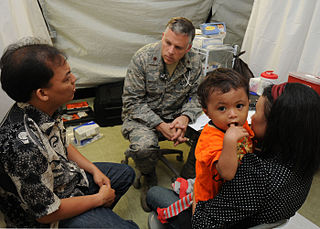
Cultural competence in healthcare refers to the ability for healthcare professionals to demonstrate cultural competence toward patients with diverse values, beliefs, and feelings. This process includes consideration of the individual social, cultural, and psychological needs of patients for effective cross-cultural communication with their health care providers. The goal of cultural competence in health care is to reduce health disparities and to provide optimal care to patients regardless of their race, gender, ethnic background, native languages spoken, and religious or cultural beliefs. Cultural competency training is important in health care fields where human interaction is common, including medicine, nursing, allied health, mental health, social work, pharmacy, oral health, and public health fields.
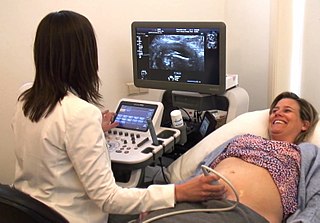
A midwife is a health professional who cares for mothers and newborns around childbirth, a specialization known as midwifery.
The role of spirituality in health care has received significant research attention due to its benefits for patients and health care professionals. Integrating spirituality in healthcare can enhance healthcare professionals' ability to communicate effectively with patients and families. It can also have a positive impact on the health and well-being of patients due to its potential to enhance patients' ability to cope with illness and achieve better physical and mental health outcomes. As per 2014, more than 70 medical schools in the United States offer courses on spirituality and medicine. The Association of American Medical Colleges has co-sponsored, with the National Institute for Healthcare Research, four conferences, on curricular development in spirituality and medicine since 1997.
Bernadette J. Mazurek Melnyk is an American nurse. She is a professor of pediatrics and psychiatry at Ohio State University College of Medicine and dean of the College of Nursing. Melnyk is also the editor in chief of the journal Worldviews on Evidence Based Nursing.
